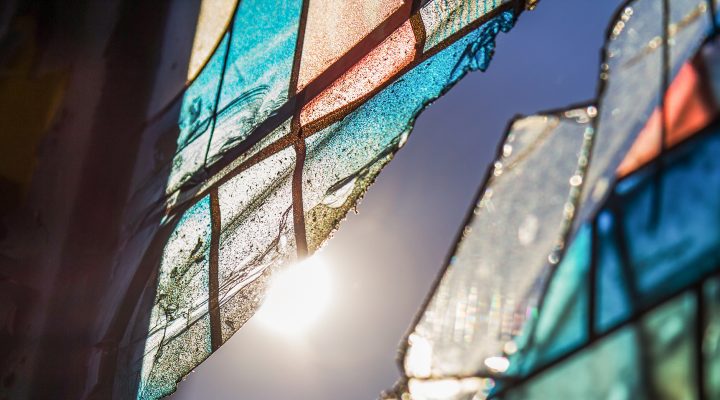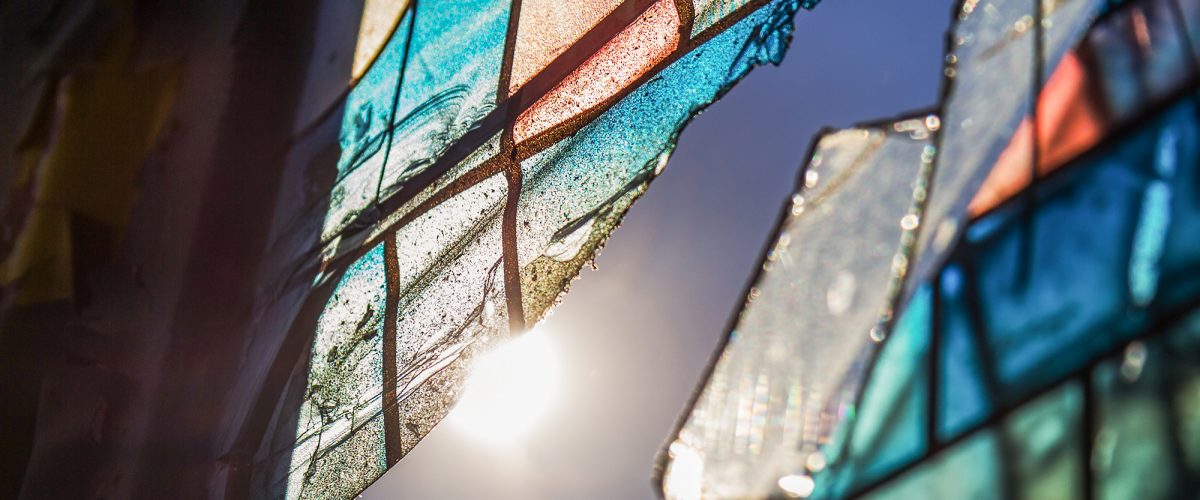“The very worst omen of the times is the fact that the religious (people) of the country stand apart to so great an extent in this hour of trial. Most of the Churches have split on the very rock upon which the State is foundering. In fact their divisions have prepared the way and laid the political foundations for the political divisions which now exist.”

Bill Leonard
Those prescient words did not originate on this year’s Twitter (aka X), Truth Social, Facebook or Christianity Today, but appeared in an 1860 editorial in The Presbyterian Herald, following Abraham Lincoln’s election to the presidency. They are cited in a now classic 1985 text titled Broken Churches, Broken Nation: Denominational Schisms and the Coming of the Civil War, written by C.C. Goen, the late professor of church history at Wesley Theological Seminary. His analysis seems alarmingly parallel to issues confronting churches and other religious communities in today’s America.
Of that Antebellum era, Goen wrote, “The relationships of religious ideas and institutions to social and political realities are both extensive and profound, and there seems to be a closer link between the denominational schisms and the coming of the war than has been commonly recognized.”
His thesis suggests that “one significant factor in the disuniting of the United States, largely unexplored in the massive outpouring of publications about the Civil War and its antecedents, was the division of America’s popular churches into sectional factions several years before the political break.”
“There seems to be a closer link between the denominational schisms and the coming of the war than has been commonly recognized.”
In 2024, there is as yet no formal civil war, but the “disuniting” of the USA is occurring before our very eyes. Given the ways in which religion, particularly Christianity, has been drawn into that social and political calamity, churches and individuals face a watershed moment regarding the nature of both government and gospel.
Goen’s investigation “originated in the suspicion that the behavior of the popular denominations — their own inner conflicts and eventual rupture — formed a set of determinants with a significant impact in their own right.” He proposed that “when Presbyterian (1861), Methodist (1845) and Baptist (1845) churches divided along North-South lines, they severed an important bond of national union; that the forebodings of their leaders and of contemporary observers regarding the probability of disastrous political consequences were well founded; and that the denominational schisms, as irreversible steps along the nation’s tortuous course to violence, were both portent and catalyst of the imminent national tragedy.”
What’s old is new
That was then; this is now. Goen’s description of America circa 1860, highlighted above, seems strikingly applicable to the “broken churches, broken nation” of 2024. For example, the three 19th-century “popular denominations” referenced by Goen are again divided, as evidenced in the formation of the Alliance of Baptists (1987) and the Cooperative Baptist Fellowship (1991) from the Southern Baptist Convention, the 2011 origins of ECO: the Covenant Order of Evangelical Presbyterians out of the Presbyterian Church (USA), and the Global Methodist Church, organized from a split within United Methodism in 2022. While those three traditional denominations are but a few of the fragmented Christian communions of this era, their schisms further weakened their already declining ranks.
While a full-blown civil conflict does not seem imminent, the attack on the U.S. Capitol on January 6 illustrates the nation’s “tortuous course to violence,” in an event laced with Christian and Confederate flags, crosses and Christianity-related slogans. Since then, the enduring threats of violence against poll workers, elected officials and their families, judges, teachers, pastors and others proliferates, often portrayed in apocalyptic overtones.
American Christianity has entered or been dragged into this volatile political environment amid divisions and debates over religious liberty, Christian nationalism, messianism and the meaning of evangelicalism itself. Media reports abound, with titles like, “The Church of Trump: How He’s Infusing Christianity into His Movement,” “Joe Biden Celebrated St. Patrick’s Day with Other Pro-abortion Leftists who Pretend to be Catholic,” and “What Is Christian Nationalism Exactly?
And then there are the ‘nones’
As if that were not enough, the ecclesiastical “brokenness” of our times reflects another divisive challenge for churches illustrated in the continuing rise of the “religiously unaffiliated,” described in a PRRI survey released in March 2024 as the “only major religious category experiencing widespread growth today.” The wakeup call study, conducted in 2023, reports that:
- Three in four Americans claim connection to a faith tradition, with 67% identifying as Christian.
- White American Christians declined from 46% in 2013 to 42% in 2023. Christians of color showed limited change, increasing from 24% to 25%.
- Those identifying as religiously unaffiliated increased from 21% in 2013 to 26% in 2023.
- 24% surveyed said they attended church services virtually or in person at least once a week, a 7% decline from the 31% surveyed in 2013.
- Only two in 10 indicated church attendance only once or twice a month.
PRRI CEO Melissa Deckman comments: “After observing the growth of unaffiliated Americans for decades, our survey confirms that this trend is not slowing. While most Americans are still religious, the ranks of the unaffiliated will continue to swell with both Americans who leave their religion — increasingly because of religious teachings about LGBTQ people — as well as those who are now being raised in religiously unaffiliated households.”
Ten percent of those unaffiliated individuals acknowledged they did not grow up in a religious tradition. Some 18% indicated they have come out of the religious tradition in which they were raised. Of the latter group, 35% were Roman Catholic and another 35% came from Mainline/nonevangelical churches.
The PRRI study offers these reasons regarding the departure of religiously unaffiliated individuals:
- They “stopped believing in the religion’s teaching.”
- They reacted against their “religion’s teaching about or treatment of” LGBTQ persons.
- They left as a means of “preserving their own mental health.”
- Because of “clergy sexual abuse.”
- Because their “family was not all that religious growing up.”
- Because their “church or congregation became too focused on politics.”
Surprisingly, the report noted, “Most unaffiliated Americans are not looking for a religious or spiritual home. Just four in 10 unaffiliated Americans describe themselves as spiritual.” This claim challenges the idea that younger generations of Americans think of themselves as “spiritual but not religious” or “believers but not belongers.” If this study is any indication, spirituality is less of a concern or practice among the religiously unaffiliated than has sometimes been suggested.
Certainly, some congregations continue to thrive, minister locally and globally, and retain diverse political constituents. Evangelical megachurches seem to have avoided the declines evident in the broad spectrum of denominationally based communions. Yet even they are encountering the loss of people now claiming the label “exvangelical,” many writing about their exits in recently published books.
The heart of the gospel
Rather, it is to suggest that the divisions in American churches are real and widespread, with serious implications for the future of Christianity in this country. We ignore these realities at our peril. At the heart of it all is the nature of the Christian gospel itself.
As 2024 moves toward the November national election, we Christians might ask: What is the meaning of the gospel of Jesus and how does it inform our socio-political beliefs and actions? Such a question does not guarantee agreement, but it ought to be asked anyway. If we are going to blame the gospel for the way we respond to politics, we ought at least to know what the gospel means to and for us.
“If we are going to blame the gospel for the way we respond to politics, we ought at least to know what the gospel means to and for us.”
C.C. Goen’s insights into the broken churches, broken nation of the Civil War era are well worth considering today. He wrote:
What rendered the churches vulnerable to sectionalism and dissolution, leaving them no more able than their unchurched contemporaries to eliminate slavery while saving both the Union and the peace, is that none of them had developed a comprehensive social ethic. Evangelical abolitionists may have been driven by an ethical vision, but they were poorly informed about the nature of social institutions and were therefore naïve in devising strategies for dealing with systemic evil entrenched in social structures. Southern thinkers … were strongly committed to social order and strove mightily to convince themselves and others that slavery was ethically defensible. To oversimplify only slightly, Northern churches lacked a social ethic. Southern churches lacked a social ethic.
In 2024, we would do well to reflect on such a comparison, especially before we try to make America great again, or try to help it confront an increasingly fragile future.
Bill Leonard is founding dean and the James and Marilyn Dunn professor of Baptist studies and church history emeritus at Wake Forest University School of Divinity in Winston-Salem, N.C. He is the author or editor of 25 books. A native Texan, he lives in Winston-Salem with his wife, Candyce, and their daughter, Stephanie.


